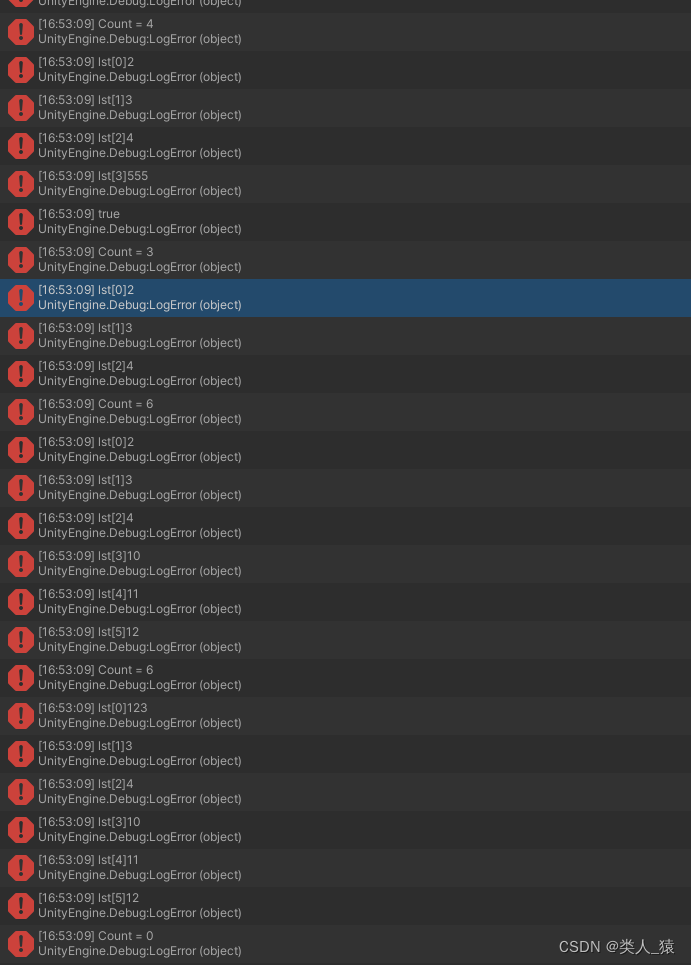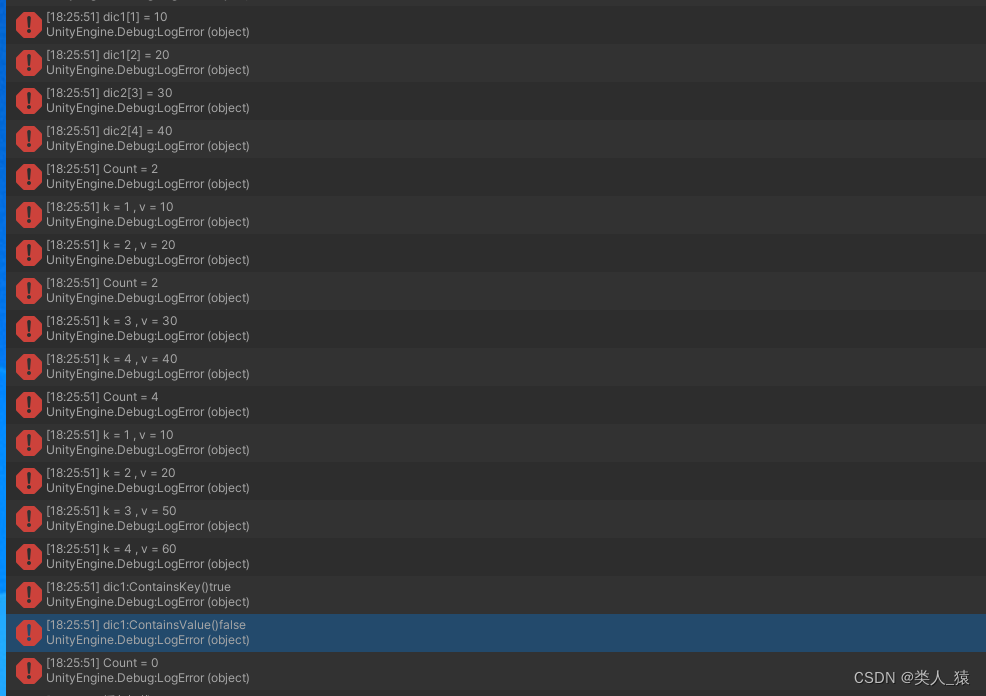ToLua使用原生C#List和Dictionary
2023-12-27 22:32:45
ToLua是使用原生C#List
介绍
当你用ToLua时C#和Lua之间肯定是会互相调用的,那么lua里面使用List和Dictionary肯定是必然的,在C#中可以调用LuaTable、LuaDictTable、LuArrayTable这三种和List、Dictionary进行互相转换和调用,在Lua里面其实也可以将List和Dictionary转换成LuaTable,不转换当然也可以使用。
Lua中使用原生List
这里我会将一些我用到的基础用法列举一下,List< T >自定义的T也是支持的,这里不具体展示了
下面是两个List表传入到Lua中,在lua中操作两个List
C#调用lua
无GC的调用可以参考我无GC调用lua的文章
List<int> lst = new List<int>();
lst.Add(2);
lst.Add(3);
lst.Add(4);
List<int> lst2 = new List<int>();
lst2.Add(10);
lst2.Add(11);
lst2.Add(12);
//Util.CallMethod("UIMainCityCtrl", "CSharpListTest", lst, lst2);
Util.NoGCCallMethod<List<int>,List<int>>("UIMainCityCtrl", "CSharpListTest", lst, lst2);
Lua中操作
这里其实已经把List打了Wrap文件,所以List是可以在lua中直接调用如下所示的一些常规操作
function UIMainCityCtrl.CSharpListTest(CSharpList,lst2)
CSharpList:Add(555)
this.LstLog(CSharpList)
logError(tostring(CSharpList:Contains(555)))
CSharpList:Remove(555)
this.LstLog(CSharpList)
CSharpList:AddRange(lst2)
this.LstLog(CSharpList)
CSharpList:RemoveAt(0)
CSharpList:Insert(0, 123)
this.LstLog(CSharpList)
CSharpList:Clear()
this.LstLog(CSharpList)
end
function this.LstLog(lst)
logError("Count = "..lst.Count)
for i=0,lst.Count - 1 do
logError("lst["..i.."]"..lst[i])
end
end
打印测试如下
可以结合我上面的代码部分和操作对比一下下面的打印

Lua中使用原生Dictionary
C#调用lua
无GC的调用可以参考我无GC调用lua的文章
Dictionary<int,int> dic1 = new Dictionary<int,int>();
dic1.Add(1, 10);
dic1.Add(2, 20);
Dictionary<int,int> dic2 = new Dictionary<int,int>();
dic2.Add(3, 30);
dic2.Add(4, 40);
//Util.CallMethod("UIMainCityCtrl", "CSharpListTest", lst, lst2);
Util.NoGCCallMethod<Dictionary<int, int>, Dictionary<int, int>>("UIMainCityCtrl", "CSharpListTest", dic1, dic2);
Lua中操作
这里其实已经把List打了Wrap文件,所以List是可以在lua中直接调用如下所示的一些常规操作
function UIMainCityCtrl.CSharpListTest(dic1,dic2)
logError("dic1[1] = "..dic1[1])
logError("dic1[2] = "..dic1[2])
logError("dic2[3] = "..dic2[3])
logError("dic2[4] = "..dic2[4])
this.LstLog(dic1)
this.LstLog(dic2)
dic1:Add(3,50)
dic1:Add(4,60)
this.LstLog(dic1)
logError("dic1:ContainsKey()"..tostring(dic1:ContainsKey(1)))
logError("dic1:ContainsValue()"..tostring(dic1:ContainsValue(3)))
dic1:Clear()
this.LstLog(dic1)
end
function this.LstLog(dic)
logError("Count = "..dic.Count)
local iter = dic:GetEnumerator()
while iter:MoveNext() do
local k = iter.Current.Key
local v = iter.Current.Value
logError("k = "..k.." , v = "..v)
end
end
打印测试如下
可以结合我上面的代码部分和操作对比一下下面的打印

文章来源:https://blog.csdn.net/qq_42194657/article/details/135148349
本文来自互联网用户投稿,该文观点仅代表作者本人,不代表本站立场。本站仅提供信息存储空间服务,不拥有所有权,不承担相关法律责任。 如若内容造成侵权/违法违规/事实不符,请联系我的编程经验分享网邮箱:veading@qq.com进行投诉反馈,一经查实,立即删除!
本文来自互联网用户投稿,该文观点仅代表作者本人,不代表本站立场。本站仅提供信息存储空间服务,不拥有所有权,不承担相关法律责任。 如若内容造成侵权/违法违规/事实不符,请联系我的编程经验分享网邮箱:veading@qq.com进行投诉反馈,一经查实,立即删除!